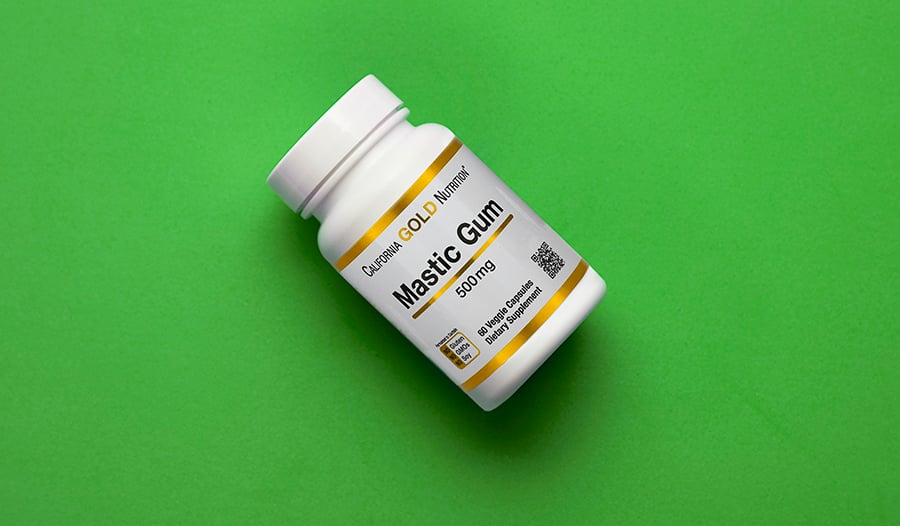Вы слышали о мастичной камеди? Вот ее восемь целебных свойств

Мастичная камедь (Pistacia lentiscus) — это смола мастичных деревьев, произрастающих в Средиземноморском регионе. Она также известна как «слезы Хиоса» и по традиции производится в виде «слез» или леденцов на острове Хиос в Греции.
Ее аромат, напоминающий аромат сосны, в прошлом использовался для освежения дыхания, а также в качестве ароматизатора. Слово мастика происходит от греческого слова «мастихеин», что означает «скрежетать зубами». Гиппократ был первым, кто упомянул в письменном источнике использование мастичной камеди при проблемах с пищеварением, лечении простуды и, конечно же, для освежения дыхания.
Мастичная камедь может обладать множеством лечебных свойств. Ее можно принимать в форме капсул, настойки, порошка, масла или жевать как жевательную резинку.
Вот некоторые целебные свойства мастичной камеди.
1. Может предотвратить повреждение печени
Одно исследование показало, что у тех, кто принимал 5 г порошка мастичной камеди в течение 18 месяцев, уровень печеночных ферментов был ниже, чем у тех, кто не делал этого. В результате, исследователи определили, что порошок мастики с Хиоса может защищать печень от повреждения.
2. Может защитить сердце
Люди, принимавшие 5 г мастичной камеди в день, также отметили снижение уровня общего холестерина, липопротеинов низкой плотности (ЛПНП) или плохого холестерина в сыворотке крови, а также уменьшение соотношения общего холестерина и липопротеинов высокой плотности (ЛПВП). Более низкий уровень холестерина приводит к улучшению здоровья сердца и кровеносных сосудов.
Высокий уровень холестерина ЛПНП является критическим фактором риска сердечных заболеваний и инсульта. Благодаря свойству снижать уровень холестерина мастичная камедь может быть хорошим средством для тех, кто хочет улучшить свое сердечно-сосудистое здоровье
3. Может помочь пациентам с болезнью Крона
Болезнь Крона, распространенная форма воспалительного заболевания кишечника (ВЗК), вызывает воспаление в пищеварительном тракте, ведущее к боли, сильной диарее, потере веса, анемии и утомляемости. Пациенты с болезнью Крона также подвержены повышенному риску развития колоректального рака.
Участники одного исследования, принимавшие мастичную камедь в течение четырех недель, сообщили о значительном ослаблении воспалительных симптомов болезни Крона. Исследователи также отметили снижение уровня воспалительных маркеров IL-6 и С-реактивного белка.
4. Может снизить уровень сахара в крови
Результаты одного исследования свидетельствуют, что у людей, которые принимали мастичную камедь, всего через восемь недель уровень сахара в крови стал ниже, чем у тех, кто принимал плацебо. Повышенный уровень сахара в крови может привести к диабету и инсулинорезистентности. Исследования на животных моделях с диабетом показали, что мастичная камедь снижает уровень глюкозы в сыворотке крови.
Интересное наблюдение в исследованиях на людях показало, что мастичная камедь приносила наиболее значительную пользу участникам с избыточным весом или ожирением с индексом массы тела более 25 кг/м2.2.
5. Может облегчить проблемы с пищеварением
Имеются свидетельства того, что при приеме мастичной камеди уменьшаются боль и дискомфорт в животе.
Бактерии Helicobacter pylori, частая причина язвы желудка, могут уничтожаться мастичной камедью. 19 из 52 участников одного исследования избавились от H. pylori после двух недель жевания мастичной камеди. Поскольку H. pylori становятся устойчивыми к антибиотикам, мастичная камедь может стать хорошей альтернативой традиционному лечению или возможной дополнительной естественной терапией.
Также было продемонстрировано, что мастичная камедь уничтожает по меньшей мере шесть других бактерий, вызывающих язву в пищеварительном тракте.
6. Может предотвратить кариес
Mutans streptococci — это тип бактерий, которые способствуют развитию кариеса в зубах. В небольшом исследовании участники жевали мастичную камедь три раза в день в течение трех недель. Исследователи отметили, что к концу исследования у участников снизился уровень Mutans streptococci.
Кислая слюна или слюна с низким pH также является фактором риска образования кариеса. У участников, которые жевали чистую мастичную камедь, наблюдалось повышение pH слюны, а не значительное увеличение. Тем не менее, повышенный уровень pH слюны — хороший результат, если речь идет о профилактике кариеса.
7. Может облегчить состояние при аллергической астме
Для пациентов с аллергической астмой характерны гиперреактивные дыхательные пути с воспалением и эозинофилией или аномальный приток лейкоцитов, называемых эозинофилами, который наблюдается при аллергических реакциях.
В одном исследовании мастичная камедь продемонстрировала значительный эффект подавления эозинофилии. Она также снижает гиперреактивность дыхательных путей, подавляя выработку маркеров воспаления. Эти результаты показывают, что мастичная камедь может ингибировать клетки, вызывающие воспаление дыхательных путей из-за гиперактивности при наличии аллергена.
Людям, страдающих аллергической астмой, следует внимательно рассмотреть вопрос об использовании мастичной камеди в качестве основного средства контроля и профилактики симптомов.
8. Может облегчить изжогу
Изжога или кислотный рефлюкс — распространенное заболевание у многих людей по всему миру. Неконтролируемая изжога может привести к раку пищевода, если ее не лечить.
В одном исследовании приняли участие 148 пациентов с функциональной диспепсией. Участники получали мастичную камедь три раза в день в течение трех недель. Симптомы тех, кто принимал мастичную камедь, значительно улучшились по сравнению с симптомами тех, кто получал плацебо.
В группе получателей мастичной камеди уменьшились изжога, тупая боль в верхней части живота, общая боль в животе и боль в животе при тревоге.
Побочные эффекты и риски приема мастичной камеди
Существенных побочных эффектов при использовании мастичной камеди не наблюдалось. Некоторые пользователи сообщали о запоре, диарее, тошноте, головной боли и головокружении, однако мастичная камедь обычно хорошо переносится.
Поскольку добавки не регулируются Управлением по безопасности пищевых продуктов и медикаментов США (FDA), покупайте мастичную камедь у надежных поставщиков.
Не принимайте мастичную камедь, если вы беременны или кормите грудью.
Выводы
Мастичная камедь имеет множество потенциальных целебных свойств для многих систем организма. Она может помогать при ряде проблем со здоровьем: от облегчения симптомов язвы и астмы до улучшения пищеварения и снижения уровня холестерина.
Мастичная камедь, как правило, хорошо переносится. Она безопасна, и на сегодняшний день не сведений о каких-либо ее серьезных побочных эффектах и взаимодействии с другими лекарственными средствами. Однако всегда консультируйтесь с врачом перед тем, как начинать прием новых пищевых добавок.
Источники:
- Triantafyllou A, Chaviaras N, Sergentanis TN, Protopapa E, Tsaknis J. Chios mastic gum modulates serum biochemical parameters in a human population. J Ethnopharmacol. 2007;111(1):43-49. doi:10.1016/j.jep.2006.10.031
- Triantafyllidi A, Xanthos T, Papalois A, Triantafillidis JK. Herbal and plant therapy in patients with inflammatory bowel disease. Ann Gastroenterol. 2015;28(2):210-220.
- Dabos KJ, Sfika E, Vlatta LJ, Giannikopoulos G. The effect of mastic gum on Helicobacter pylori: a randomized pilot study. Phytomedicine. 2010;17(3-4):296-299. doi:10.1016/j.phymed.2009.09.010
- Biria M, Eslami G, Taghipour E, Akbarzadeh Baghban A. Effects of Three Mastic Gums on the Number of Mutans Streptococci, Lactobacilli and PH of the Saliva. J Dent (Tehran). 2014;11(6):672-679.
- Spyridopoulou K, Tiptiri-Kourpeti A, Lampri E, et al. Dietary mastic oil extracted from Pistacia lentiscus var. chia suppresses tumor growth in experimental colon cancer models. Sci Rep. 2017;7(1):3782. Published 2017 Jun 19. doi:10.1038/s41598-017-03971-8
- Mei‐Lan He M.D. Hui‐Qing Yuan Ph.D. An‐Li Jiang M.D. Ai Yu Gong M.Sc. Wei‐Wen Chen M.D. Peng‐Ju Zhang M.D. Charles Y. F. Young Ph.D. Jian‐Ye Zhang Ph.D. Gum mastic inhibits the expression and function of the androgen receptor in prostate cancer cells. Published 2006 May 11. doi/abs/10.1002/cncr.21935
- Qiao J, Li A, Jin X, Wang J. Mastic alleviates allergic inflammation in asthmatic model mice by inhibiting recruitment of eosinophils. Am J Respir Cell Mol Biol. 2011;45(1):95-100. doi:10.1165/rcmb.2010-0212OC
- Konstantinos J. Dabos, Ekaterini Sfika, Lisa J. Vlatta, Despoina Frantzi, Georgios I. Amygdalos, Georgios Giannikopoulos, Is Chios mastic gum effective in the treatment of functional dyspepsia? A prospective randomised double-blind placebo controlled trial, Journal of Ethnopharmacology, Volume 127, Issue 2, 2010, Pages 205-209, ISSN 0378-8741, https://doi.org/10.1016/j.jep.2009.11.021.
ОТКАЗ ОТ ОТВЕТСТВЕННОСТИ:Информация, содержащаяся в Центре здоровья, не предназначена для постановки диагноза...
















































































 Содержание
Содержание
















